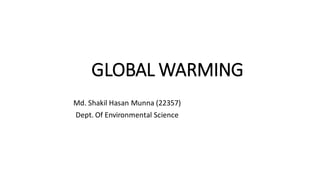global warming .pdf
- 1. GLOBAL WARMING Md. Shakil Hasan Munna (22357) Dept. Of Environmental Science
- 2. What is Global Warming?? • A gradual increase in the overall temperature of the earth’s atmosphere generally attributed to the greenhouse effect caused by increased levels of carbon dioxide, CFCs, and other pollutant. • Global warming is the rise in the average temperature of oceans also.
- 3. CONTD… • Since the early 20th century, Earth’s mean surface temperature has increased by about 0.8 °C (1.4 °F), with about two-thirds of the increase occurring since 1980. • Warming of the climate system is unequivocal. And scientists are certain that it is primarily caused by increasing concentrations of greenhouse gases produced by human activities such as the burning of fossil fuels and deforestation.
- 4. Effects • Sea level rise is accelerating.The planet’stemperature. • The number of large wildfires is growing. • Dangerousheat waves are becoming more common. • Extreme storm events are increasing in many areas. • Extreme storm events are increasing in many areas. • • More severe droughts are occurring in others. • These are having significantand harmful effects on our health, our environment,and our communities.
- 6. Causes of Global Warming • Global warming is primarily a problem of too much carbon dioxide (CO2) in the atmosphere which acts as a blanket, trapping heat and warming the planet. • As we burn fossil fuels like coal, oil and natural gas for energy or cut down and burn forests to create pastures and plantations,carbon accumulates and overloads our atmosphere. • Certain wastemanagement and agricultural practices aggravate the problem by releasing other potent global warming gases, such as methane and nitrous oxide.
- 8. Mitigation • Reducing the amount of future climate change is called mitigation of climate change. • The IPCC defines mitigation as activities that reduce greenhouse gas (CFC) emissions, or enhance the capacity of carbon sinks to absorb CFCs from the atmosphere. • Studies indicate substantialpotential for future reductions in emissions by a combination of emission-reducing activities such as energy conservation, increased energy efficiency.And satisfying more of society’s power demands with renewable energy and nuclear energy sources. Climate mitigation also includes acts to enhance natural sinks, such as reforestation.
